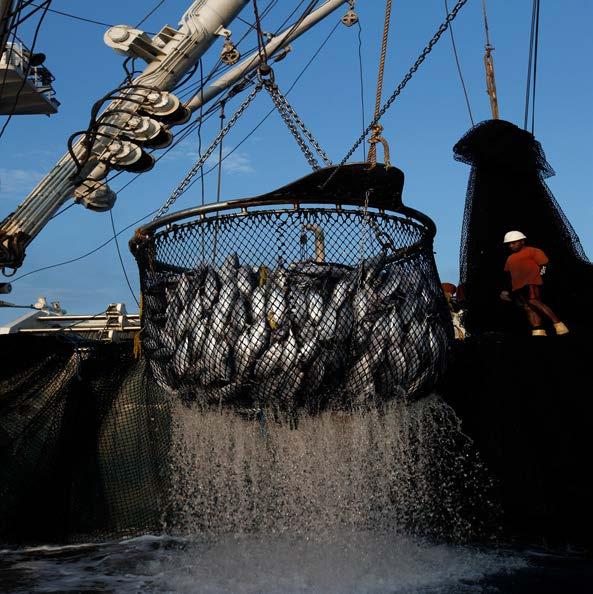
3 minute read
26 Something fishy?
Blue Marine Foundation
Something
fishy
JESS RATTLE,
HEAD OF INVESTIGATIONS AT BLUE MARINE FOUNDATION, OPENS THE CAN ON EUROPEAN OVERFISHING OF TUNA IN THE TROPICS

When we think of tuna, some might picture delicious, seared steaks with
soy, or thinly sliced sashimi. Others might think of conveniently stacked cans on a shelf in their pantry. A few might picture the fish themselves – powerful, predatory animals that can reach weights of at least 400lb (190kg) and lengths of nearly seven feet.
But few will think about the missing tuna in the Indian Ocean – missing because they’ve been caught in their millions as juveniles by giant industrial fishing vessels, far out of sight of those who consume them. And yet, these missing fish should be at the forefront of our minds, as the globally vital Indian Ocean yellowfin tuna stock has been overfished in the Indian Ocean since 2015.
A whopping 1.2 million metric tonnes of tuna from the Indian Ocean was landed in 2018, with an estimated dock value of $2.7 billion. The zone is one of the world’s most important fisheries, not only for the industrial, distant-water Spanish and French fleets that supply the processing plants with fish to be canned and shipped off to Europe, but also for the coastal communities who depend on tuna for survival. The Maldives is ranked highest in the world in terms of tuna consumption at 163kg per capita, with the fishery industry supporting the livelihoods of over 30 percent of the nation’s population.

Perhaps because of this, the Maldives has taken a leading role in trying to put management measures in place to protect the migratory yellowfin stock. This has been most apparent at recent meetings of the Indian Ocean Tuna Commission (IOTC) – the UN FAO intergovernmental body responsible for managing these shared stocks and bringing together the 30-or-so countries that fish them.
However, despite the best efforts of states like the Maldives and Kenya, yellowfin tuna continues to be heavily overfished. Four consecutive stock-rebuilding plans have all failed to bring fishing pressure down to a sustainable level.
One might be forgiven for assuming that Indian Ocean countries with extensive coastlines and large populations like India, Pakistan and Tanzania would be the biggest harvesters. However, Spain alone catches more than double the amount of tropical tuna in the Indian Ocean than these three combined. In fact, the EU takes more overfished yellowfin tuna than any other IOTC member and has done so since long before 2015.
Spain is able to achieve this thanks to its fleet of huge-purse ‘seine’ vessels that each use hundreds of drifting fish aggregating devices (or ‘FADs’) to catch whole schools of mostly juvenile fish, as well as (unintended) sharks and turtles. The impact that these FADs have on fragile marine habitats was described by April Burt in Loupe last year.
It seems that fishing pressure will now need to drop by almost a third to save the stock – no mean feat, but an achievable one if short-sightedness and greed are replaced by cooperation and accountability on the part of those most responsible.
Christopher Ward is an official supporter of Blue Marine Foundation
A French purse seine vessel loads skipjack and yellowfin tuna attracted by a fish aggregation device in the Indian Ocean

Sink differently



The C60 #tide isn’t just a professional dive watch but an example of how innovation can be harnessed for the good of the marine environment. #tide is a social enterprise that transforms discarded ocean plastic into materials that can be used in sustainable product design – such as the C60 #tide. A watch that not only boasts a pure sapphire dial, chronometer movement and water-resistance to 600m, but a woven strap and case back insert made from #tide’s ingenious upcycled plastic. Want to know more? Do your research.
christopherward.com







